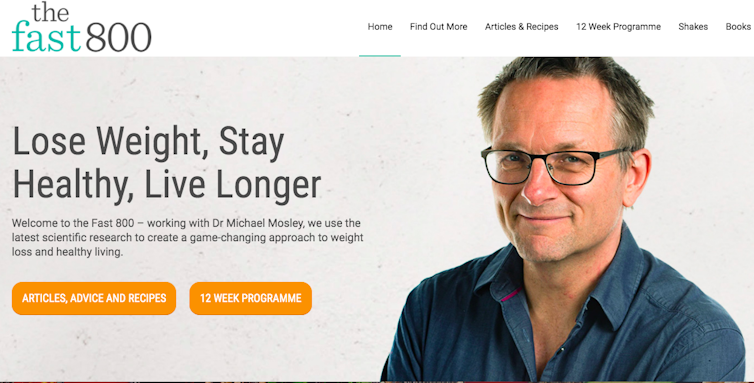The science behind diet trends like mono, charcoal detox, Noom and Fast800
- Written by Clare Collins, Professor in Nutrition and Dietetics, University of Newcastle
Every year a new batch of diets become trendy. In the past, the blood group, ketogenic, Pioppi and gluten-free diets were among the most popular. These have made way for the mono diet, charcoal detox, Noom, time-restricted feeding and Fast800.
So what are these new diets and is there any scientific evidence to support them?
Read more: Health Check: six tips for losing weight without fad diets
1. Mono diet
The monotrophic or mono diet limits food intake to just one food group such as meat or fruit, or one individual food like potato or chicken, each day.
The mono diet has no scientific basis and no research has been done on it. It’s definitely a fad and should not be followed.
It leads to weight loss because your food intake is so limited (one food per day) that you get sick of that food very quickly and so automatically achieve a reduced kilojoule intake.
If you ate three apples at each main meal and had another three as between-meal snacks then your total kilojoule intake from the 12 apples would be about 4,000 kilojoules (950 calories).
The mono diet is nutritionally inadequate. The nutrients most deficient will depend on the individual foods consumed, but if you follow the mono diet long term, you would eventually develop vitamin and mineral deficiencies.
2. Charcoal detox
The charcoal detox diet claims to help people lose weight by “detoxing” them. It involves periods of fasting and consumption of tea or juice drinks that contain charcoal.
It is definitely not recommended.
Medical professionals use activated charcoal to treat patients who have been poisoned or have overdosed on specific medications. Charcoal can bind to some compounds and remove them from the body.
There is no scientific evidence to support the use of charcoal as a weight loss strategy.
 Avoid the charcoal detox diet.
Andasea/Shutterstock
Avoid the charcoal detox diet.
Andasea/Shutterstock
Read more: Five supplements that claim to speed up weight loss – and what the science says
Charcoal detox plans also include dietary restrictions or fasts, so people might lose weight because they’re consuming fewer kilojoules.
Charcoal is not selective. It can bind to some medications and nutrients, as well as toxic substances, so there is the potential for charcoal to trigger nutrient deficiencies and/or make some medications less effective.
Side-effects of using charcoal include nausea and constipation.
3. Noom diet
The Noom diet isn’t actually a diet at all. It is a smartphone app called Noom Coach that focuses on behaviour change techniques to assist with weight loss. It allows users to monitor their eating and physical activity, and provides support and feedback.
The Noom diet does not provide a diet plan, but it gets users to record within the app, all foods and drinks consumed. It then uses a traffic light system (red, yellow, green) to indicate how healthy the foods are.
One advantage of Noom is that is doesn’t eliminate any foods or food groups, and it encourages healthy lifestyle behaviour change to assist with weight loss.
A disadvantage is that while you can download the app for a free short-term trial, membership is about A$50 per month for four months. And additional services cost extra. So consider whether this approach suits your budget.
One study has examined the app’s effectiveness. In a cohort of 35,921 Noom app users over 18 months, almost 78% reported a reduction in body weight. About 23% of these people reported losing more than 10% of their body weight.
Read more: Health Check: should you weigh yourself regularly?
Although the data are observational and don’t compare Noom app users to a control group, the results are promising.
In other weight-loss interventions in adults at risk of developing type 2 diabetes, researchers found losing 5-10% body weight and being active for about 30 minutes a day lowered the risk of developing type 2 diabetes by more than 50%.
4. Time-restricted feeding
Time-restricted feeding is a type of intermittent fast that involves restricting the time of day that you are “allowed” to eat. This typically means eating in a window lasting four to ten hours.
While energy-restriction during this period is not a specific recommendation, it happens as a consequence of eating only during a shorter period of time than usual.
 It’s unclear whether weight loss results from changes in the body after you fast, or if it’s just because you can’t eat as much in a short period of time.
Best_nj/Shutterstock
It’s unclear whether weight loss results from changes in the body after you fast, or if it’s just because you can’t eat as much in a short period of time.
Best_nj/Shutterstock
The difference between time-restricted feeding compared to other intermittent fasting strategies is that recent research suggests some metabolic benefits are initiated following a fasting period that lasts for 16 hours, as opposed to a typical overnight fast of ten to 12 hours.
Read more: Health Check: what's the best diet for weight loss?
Researchers have reported some promising effects on the amount of body fat, insulin sensitivity and blood cholesterol with time-restricted feeding windows, although some studies have reported benefits for weight but not for fat mass, blood cholesterol or markers of type 2 diabetes risk.
Further research is required to determine whether any health effects of time-restricted feeding are due to regular 16-hour fasting periods, or simply because eating over a small time window reduces energy intake.
If this approach helps you get started on a healthy lifestyle and your GP gives you the all clear, then try it. You will need to follow up with some permanent changes to your lifestyle so your food and physical activity patterns are improved in the long term.
5. Fast800
The Fast800 diet by Dr Michael Mosley encourages a daily intake of just 800 calories (about 3,350 kilojoules) during the initial intensive phase of the Blood Sugar Diet.
This lasts for up to eight weeks and is supposed to help you rapidly lose weight and improve your blood sugar levels. You can buy the book for about A$20 or pay A$175 for a 12-week online program that says it includes a personal assessment, recipes, physical and mindfulness exercises, tools, access to experts, an online community, information for your doctor and advice for long-term healthy living.
 Michael Mosley’s diet program is based on a very low daily energy intake.
Screenshot of https://thefast800.com/
Michael Mosley’s diet program is based on a very low daily energy intake.
Screenshot of https://thefast800.com/
Two recent studies provide some evidence that supports these claims: the DiRECT and DROPLET trials.
In these studies, GPs prescribed patients who were obese and/or had type 2 diabetes an initial diet of 800 calories, using formulated meal replacements. This initial phase was followed by a gradual reintroduction of food. Participants also received structured support to help them maintain the weight loss.
Both studies compared the intervention to a control group who received either usual care or treatment using best practice guidelines.
They found participants in the 800 calorie groups lost more weight and more of the adults with type 2 diabetes achieved remission than the control groups.
This is what you would expect, given the intervention was very intensive and included a very low total daily energy intake.
But the low energy intake can make the Fast800 difficult to stick to. It can also be challenging to get enough nutrients, so protocols need to be carefully followed and any recommended nutrient supplements taken.
Read more: What are 'fasting' diets and do they help you lose weight?
Fast800 is not suitable for people with a history of eating disorders or health conditions such as liver disease. So if you’re considering it, talk to your GP.
When it comes to weight loss, there are no magic tricks that guarantee success. Have a health check up with your GP, focus on making healthy lifestyle changes and if you need more support, ask to be referred to an accredited practising dietitian.
If you would like to learn more about weight loss, you can enrol in our free online course The Science of Weight Loss – Dispelling Diet Myths.
Authors: Clare Collins, Professor in Nutrition and Dietetics, University of Newcastle





